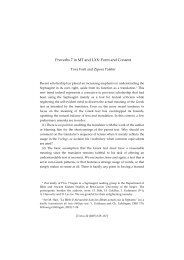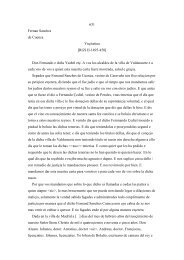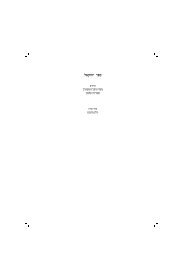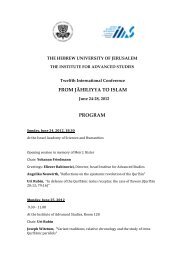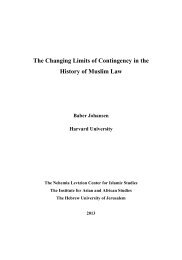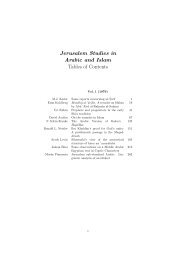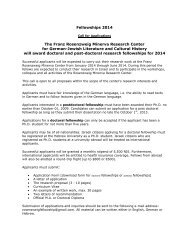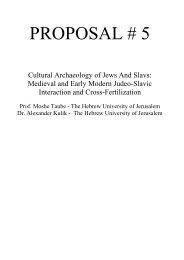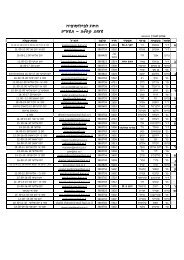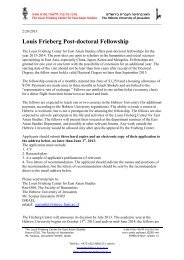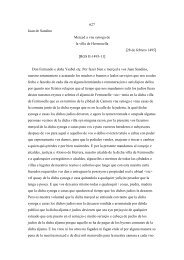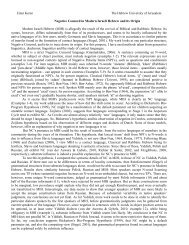THE BOOK OF EZEKIEL Moshe H. Goshen-Gottstein Shemaryahu ...
THE BOOK OF EZEKIEL Moshe H. Goshen-Gottstein Shemaryahu ...
THE BOOK OF EZEKIEL Moshe H. Goshen-Gottstein Shemaryahu ...
You also want an ePaper? Increase the reach of your titles
YUMPU automatically turns print PDFs into web optimized ePapers that Google loves.
Introduction<br />
Such sub-titles are found in a number of fragments from Qumran, both biblical and<br />
non-biblical. 22 It was decided, therefore, that such variations are of text-critical significance<br />
and worthy of recording in a critical edition.<br />
33. Apparatus I includes variants collated from the primary versions, translated directly<br />
from the Hebrew. 23 The sources are indicated by the following symbols:<br />
Masoretic Text x<br />
Septuagint ]<br />
Vulgate *<br />
Targum Jonathan T<br />
Peshitta . [<br />
34. Main classes of variants between a version and x:<br />
(a) Recurrent deviations from x mostly due to grammatical differences and syntactic structure,<br />
simplification of expression, contextual adjustment, and the like. However, the possibility<br />
that such deviations reflect a Hebrew Vorlage that differed from the MT must be taken<br />
into account. They are therefore marked by verbal symbols such as ‘pers’, ‘num’, ‘verb’,<br />
indicating the type of phenomenological variation, as explained below in §53. The quantity<br />
of such differences exceeds by far that of all other reconstructed variants. Variants that can<br />
be characterized as phenomenological, either at the level of translation technique or scribal<br />
transmission, are generally considered of less importance than more ‘material’ variants,<br />
which are less likely to derive from these processes.<br />
35. Variations in the use of waw in the versions are fully recorded in Apparatus I only for<br />
] and are presented in two ways: 24 If the editors consider it more likely that translation<br />
technique caused a variation (taking into account the syntax of the various languages), this<br />
is indicated by the phenomenon marker &; otherwise the omission is marked by a minus<br />
symbol. Variants in the use of waw for fragments from the Judean Desert are fully recorded<br />
in Apparatus II and for selected masoretic manuscripts in Apparatuses III-IV. 25<br />
36. (b) Differences between x and a version which may reflect ‘material’ variants, such<br />
as pluses or minuses in the text, 26 or variances in wording other than the types of variation<br />
22 For example, Isa 15:1, 17:1, 19:1 (a`en `yn, wync `yn, etc.); Jer 48:1, 49:1, 7, 28 (a`enl, pal oenr i ,<br />
etc.) et al.; CD X 14 (zayd lr).<br />
23 Putative secondary influences of one version on another are usually disregarded, since in most cases,<br />
it is practically impossible to differentiate between influence and similar, yet independent,<br />
renderings.<br />
24 If the evidence of ]h is particularly strong, and makes sense syntactically, variations in the use of<br />
waw are recorded; cf. 11:10.<br />
25 The editors doubt the importance of variant readings involving copulative or any other syntactic waw,<br />
even when attested in a Hebrew source, because the use of waw in Biblical Hebrew, as of analogous<br />
morphemes in a translational language, does not enable definite evaluation of differences. Similar<br />
considerations also pertain to the use of the word kol (see below, §53). A variant concerning waw<br />
was recorded for a version other than ] only when the syntactic/textual environment seemed to<br />
justify this (cf., e.g., 25:7, 9). Cf. Tov, TCU, 154–158.<br />
26 The LXX of Ezekiel has a significant number of minus readings (some 553 in the present apparatus),<br />
amounting, according to one estimate, to some 625 words = some 35 verses if taken altogether (cf.<br />
G. Marquis, The Translation Technique Reflected in LXX-Ezekiel [unpublished MA thesis, Dept. of<br />
xviii



